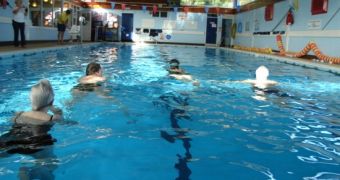This May 17, the Centers for Disease Control (CDC) went public with the news that, according to an investigation they carried out back in 2012, over 50% of the public swimming pools in the United States contain traces of poop.
The CDC reached this conclusion following their testing water samples collected from 161 public pools located in the Atlanta, Georgia region.
As the CDC write in their report, a whopping 58% of these pools were contaminated with fecal matter.
The specialists who took part in this research explain that the water in these pools tested positive for Escherichia coli bacteria, which is commonly found in poop.
The CDC suspects that said bacteria made its way into the pools with the help of people who for some reason do not shower prior to their going swimming.
Despite the fact that chlorine and other disinfectants are more often than not added to the water in such public swimming pools in order to help keep it somewhat clean, the CDC warns that these chemical compounds do not have an instantaneous effect.
Thus, it takes some time before they succeed in killing the germs present in the water.
Because of this, those who go swimming need give due consideration to their hygiene, Business Insider says.
One other bacteria found in 59% of the swimming pools taken into consideration for this research was Pseudomonas aeruginosabacteria, which is commonly found in dirt.
However, the specialists were unable to say whether this bacteria was introduced by swimmers or simply migrated in the pool from the surrounding environment.
Both bacteria found in these pools can affect people, causing them to develop skin reactions, infections and diarrhea.
“Pool users should be aware of how to prevent infections while swimming. Remember, chlorine and other disinfectants don’t kill germs instantly,” study leader Michele Hlavsa wished to emphasize.
“That’s why it’s important for swimmers to protect themselves by not swallowing the water they swim in and to protect others by keeping feces and germs out of the pool by taking a pre-swim shower and not swimming when ill with diarrhea,” he further added.

 14 DAY TRIAL //
14 DAY TRIAL //